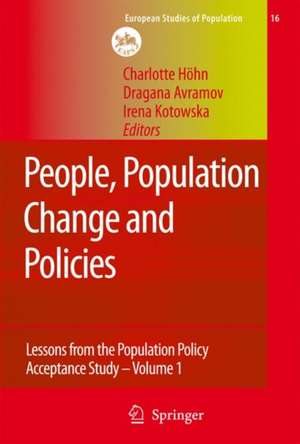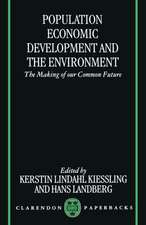People, Population Change and Policies: Lessons from the Population Policy Acceptance Study Vol. 1: Family Change: European Studies of Population, cartea 16/1
Editat de Charlotte Höhn, Dragana Avramov, Irena E. Kotowskaen Limba Engleză Hardback – 18 mar 2008
| Toate formatele și edițiile | Preț | Express |
|---|---|---|
| Paperback (2) | 947.50 lei 6-8 săpt. | |
| SPRINGER NETHERLANDS – 14 noi 2014 | 947.50 lei 6-8 săpt. | |
| SPRINGER NETHERLANDS – 19 sep 2014 | 952.09 lei 6-8 săpt. | |
| Hardback (1) | 960.78 lei 6-8 săpt. | |
| SPRINGER NETHERLANDS – 18 mar 2008 | 960.78 lei 6-8 săpt. | |
| Mixed media product (1) | 956.03 lei 6-8 săpt. | |
| SPRINGER NETHERLANDS – 18 mar 2008 | 956.03 lei 6-8 săpt. |
Din seria European Studies of Population
-
 Preț: 231.11 lei
Preț: 231.11 lei - 15%
 Preț: 644.49 lei
Preț: 644.49 lei - 18%
 Preț: 952.57 lei
Preț: 952.57 lei - 18%
 Preț: 951.47 lei
Preț: 951.47 lei - 18%
 Preț: 953.65 lei
Preț: 953.65 lei - 18%
 Preț: 957.44 lei
Preț: 957.44 lei - 15%
 Preț: 640.88 lei
Preț: 640.88 lei - 24%
 Preț: 799.81 lei
Preț: 799.81 lei - 15%
 Preț: 635.80 lei
Preț: 635.80 lei - 15%
 Preț: 649.06 lei
Preț: 649.06 lei -
 Preț: 395.25 lei
Preț: 395.25 lei - 18%
 Preț: 951.29 lei
Preț: 951.29 lei - 18%
 Preț: 895.27 lei
Preț: 895.27 lei -
 Preț: 393.35 lei
Preț: 393.35 lei - 15%
 Preț: 593.91 lei
Preț: 593.91 lei - 15%
 Preț: 644.49 lei
Preț: 644.49 lei -
 Preț: 415.18 lei
Preț: 415.18 lei - 18%
 Preț: 946.10 lei
Preț: 946.10 lei - 15%
 Preț: 640.88 lei
Preț: 640.88 lei - 18%
 Preț: 951.29 lei
Preț: 951.29 lei - 15%
 Preț: 643.34 lei
Preț: 643.34 lei - 20%
 Preț: 554.98 lei
Preț: 554.98 lei -
 Preț: 383.12 lei
Preț: 383.12 lei -
 Preț: 383.12 lei
Preț: 383.12 lei - 15%
 Preț: 580.79 lei
Preț: 580.79 lei
Preț: 960.78 lei
Preț vechi: 1171.68 lei
-18% Nou
Puncte Express: 1441
Preț estimativ în valută:
183.85€ • 196.59$ • 153.29£
183.85€ • 196.59$ • 153.29£
Carte tipărită la comandă
Livrare economică 17 aprilie-01 mai
Preluare comenzi: 021 569.72.76
Specificații
ISBN-13: 9781402066085
ISBN-10: 1402066082
Pagini: 456
Ilustrații: XI, 443 p.
Dimensiuni: 155 x 235 x 30 mm
Greutate: 0.89 kg
Ediția:2008
Editura: SPRINGER NETHERLANDS
Colecția Springer
Seria European Studies of Population
Locul publicării:Dordrecht, Netherlands
ISBN-10: 1402066082
Pagini: 456
Ilustrații: XI, 443 p.
Dimensiuni: 155 x 235 x 30 mm
Greutate: 0.89 kg
Ediția:2008
Editura: SPRINGER NETHERLANDS
Colecția Springer
Seria European Studies of Population
Locul publicării:Dordrecht, Netherlands
Public țintă
ResearchCuprins
Theoretial Background, Methods and Opportunities for Analyses of the International Population Pocicy Acceptance Study Database (IPPAS).- From Population Policy Acceptance Surveys to the International Database.- Selected Statistical Methods to Analyse IPPAS.- Pathways of Welfare and Population-related Policies.- Attitudes Towards (The Change of) The Family.- Attitudes Towards Forms of Partnership.- Family Transformations in the Post-Communist Countries: Attitudes Toward Changes.- Value of Children.- Motivation to have Children in Europe.- Intergenerational Changes in the Value System in Europe.- Attitudes and Intentions Toward Childlessness in Europe.- Fertility Intentions.- Will we Witness an Upturn in European Fertility in the Near Future?.- Fertility Preferences and Expectations Regarding Old Age.- The Influence of Education and Family Policies on Age at First Birth.- Reconciliation of Work and Family.- Preferences Regarding Reconciliation of Family and Professional Life Versus Reality.- Reconciliation of Work and Family Within Different Institutional Settings.- Work-Family Orientation and Female Labour Market Participation.- Family Related Policies.- Family Policies: Financial or Institutional Measures?.- Anticipated Impact of Family Policies on Fertility Behaviour Among the Childless and Among One-Child Parents.- Preferences Versus Actual Family Policy Measures.
Recenzii
From the reviews:
"This publication is a welcome exception to the rule that an international study yields one volume of comparative chapters and another devoted to analysis of the data of each participating country. … The first volume focuses on family change … . The different chapters and consequently, the summary contain a great many novel and thought-provoking observations. … people thinking about policies, or working and writing on Europe’s population issues will, no doubt, find it useful to have these volumes at hand on their desk." (Dirk J. van de Kaa, European Journal of Population, Vol. 25, 2009)
"This publication is a welcome exception to the rule that an international study yields one volume of comparative chapters and another devoted to analysis of the data of each participating country. … The first volume focuses on family change … . The different chapters and consequently, the summary contain a great many novel and thought-provoking observations. … people thinking about policies, or working and writing on Europe’s population issues will, no doubt, find it useful to have these volumes at hand on their desk." (Dirk J. van de Kaa, European Journal of Population, Vol. 25, 2009)
Textul de pe ultima copertă
This two-volume work presents social cohesion and demographic challenges that are associated with low birth rates and population ageing. It does so from the perspective of citizens and key policy actors. The work analyses peoples’ attitudes about demographic trends and expectations towards private networks and public policies. It places these in the societal context of national specificities in the fourteen countries and regards them as part of the dynamics of the European integration process.
Volume 1 focuses on research findings related to family issues. Its main topics are: attitudes towards family and family change, value of children, fertility intentions, and views on work-family-balance. Particular attention is given to the acceptance of and expectations about family-policies. Additionally, the reader finds methodological and theoretical chapters and learns about the background of the DIALOG project.
This book is the outcome of the DIALOG research project, funded by the European Commission under the 5th Framework Programme.
Volume 1 focuses on research findings related to family issues. Its main topics are: attitudes towards family and family change, value of children, fertility intentions, and views on work-family-balance. Particular attention is given to the acceptance of and expectations about family-policies. Additionally, the reader finds methodological and theoretical chapters and learns about the background of the DIALOG project.
This book is the outcome of the DIALOG research project, funded by the European Commission under the 5th Framework Programme.
Caracteristici
International comparative analysis of surveys on demographic change based on about 34000 interviews in 14 European countries Lessons drown on what future will demographic trends bring and what will be the consequences for the family, children, equal opportunities and the ageing of the population















